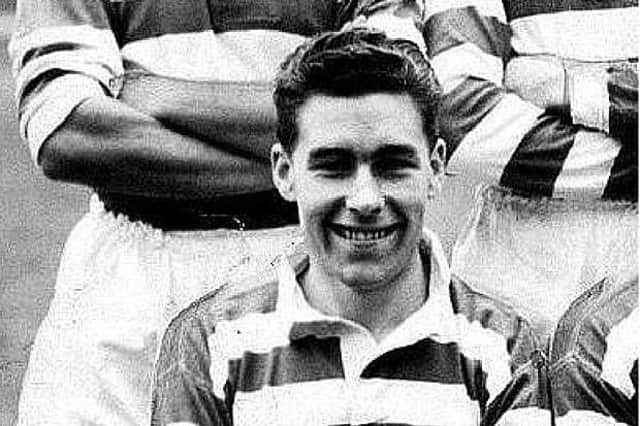Obituary: Bobby Carrol, footballer


After excelling at the Junior version of the game, Bobby Carroll did not quite have a glittering senior career in professional football, yet he made a bit of history that will never be forgotten as long as Celtic play.
An under-achieving side at the time, Celtic made it into Europe’s Inter Cities Fairs Cup – equivalent to today’s Europa League – after finishing third behind Dundee and Rangers in the Scottish League First Division in season 1961-62, though their qualification was actually achieved by winning the Glasgow Cup, beating the now defunct Third Lanark 3-2 in May, 1962.
Advertisement
Hide AdAdvertisement
Hide AdTheir first competitive venture in Europe saw them travel to the Spanish city of Valencia where, on 26 September, 1962, Celtic were beaten 4-2. Celtic’s first goal in European competition was credited to the late Manuel Mestre, known as Manolo, the Spanish internationalist central defender who died in 2008.
It was Carroll’s shot which was deflected by Mestre, and nowadays he might have been able to claim the goal as his, but at that time the authorities were very strict in apportioning blame for own goals.
Celtic’s second goal against Valencia, the then holders of the trophy, was most definitely scored by Carroll, and he thus became the first Celtic player to score in European competition, though Celtic made no further progress as they drew 2-2 at home with Valencia who went on to beat Dunfermline Athletic and Hibernian on their way to retaining the trophy.
Interviewed in 2012, Carroll said: “Any time I do go to Celtic Park I still see myself scoring that goal. Celtic have such a rich history in Europe with the Lisbon Lions winning in 1967, but it feels great to know I’ll always have my wee piece of history with Celtic.”
Carroll grew up in the Lambhill area of Glasgow and followed Partick Thistle at first. He was apprenticed as a railwayman in his teens but it was clear that his football talents were developing and as so many players did at that time, after signing provisional forms for Celtic, then managed by Jimmy McGrory, Carroll served his footballing apprenticeship in the junior ranks, playing for top Ayrshire side Irvine Meadow.
His feats as a striker for the ‘Medda’ were nothing short of phenomenal. He scored 78 goals in one season for them, and his proudest moment in the juniors came when Irvine Meadow beat Shettleston in front of 65,000 spectators at Hampden Park on May 16, 1959. Both goals in Irvine’s 2-1 victory came from the penalty spot and were scored by Jackie Morrison.
After an open-topped bus parade through Irvine, Carroll, who was also named player of the year in Scottish Junior football that season, found out that he was going into the senior ranks.
McGrory called the 21-year-old Carroll back to Parkhead and he went almost straight into the first XI, making his debut in the first home match of season 1959-60.
Advertisement
Hide AdAdvertisement
Hide AdBack then the Scottish League Cup started with sections, and Celtic did not even make it out of their section after losing that tie to 1-2 to Partick Thistle on August 12, 1959. Carroll’s first goal at senior level was not long delayed, as a week later he scored the opening goal in Celtic’s First Division season, though Celtic eventually lost 2-4 to Airdrieonians at Broomfield Park.
It was a dreadfully poor season for Celtic by their standards. The club was in some disarray behind the scenes and that season they finished just ninth in the league and lost their Scottish Cup semi-final to Rangers after a replay, the first match witnessed by a crowd of 80,000.
Carroll played 12 games in all and scored twice.
Reserve football was much more important in those days and while playing for the reserves, Carroll was coached by Jock Stein and played alongside the likes of Billy McNeill, Bobby Murdoch, and John Clark. Stein would later make some of those reserves into Lisbon Lions, and who knows what might have happened had Carroll stayed under his influence? Instead Stein went off to manage Dunfermline in March, 1960.
The following season saw Carroll become a regular in the first team, playing as a winger, but Celtic were again doomed to a trophy-less season apart from sharing the Glasgow Merchants Charity Cup with Clyde. Carroll did play in the Glasgow Cup Final of 1960-61, but Celtic lost 0-2 to Partick Thistle and Carroll never did win a medal with the Celts.
His outings for the first team diminished as Stevie Chalmers, John Hughes, Charlie Gallagher and John Divers were often preferred in his favoured striking positions.
A parting of the ways became inevitable. In February 1963, Carroll was transferred to St Mirren for £7,000 fee. He had scored 27 goals in 78 competitive appearances for Celtic.
Carroll enjoyed some success with St Mirren, notably with his two hat-tricks against Partick Thistle and Hearts, the latter being the core of a 7-2 victory for the Saints.
Dundee United signed Carroll in 1965, but he only played twice in the League for them before moving to Northern Ireland with Irish league side Coleraine.
Advertisement
Hide AdAdvertisement
Hide AdHe returned shortly afterwards to Scotland with Queen of the South before reverting to the junior ranks with Irvine Meadow in 1968.
After retiring as a player, Carroll coached junior side Yoker Athletic and was also a scout for Carlisle United.
In later life, Carroll worked as a sales representative in hydraulics, and lived in Calderwood, East Kilbride, where he died two days before his 78th birthday.
Carroll is survived by his wife Ann with whom he had three children. His son Paul also played for Irvine Meadow.
Bobby Carroll’s funeral has already taken place. Among the mourners at South Lanarkshire Crematorium were Lisbon Lions Bertie Auld and Billy McNeill.